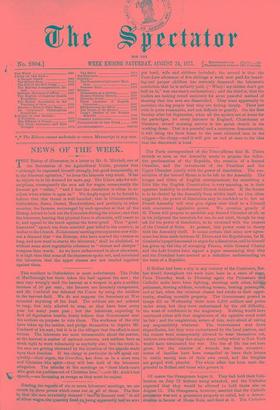The Paris correspondent of the Times affirms that M. Thiers
intends as soon as the Assembly meets to propose the defini- tive proclamation of the Republic, the creation of a Second Chamber, and the investment of the President and the Upper Chamber jointly with the power of dissolution. The con- stitution of the Second House is to be left to the Assembly. The hunger and thirst of English correspondents for something a little like the English Constitution is very amusing, as is their apparent inability to understand French instincts. If the Senate is to be elected by the Assembly from within itself, an idea often suggested, the power of dissolution may be confided to it, but no French Assembly will ever give rights over itself to a Council with concurrent legislative power. We question greatly if M. Thiers will propose to establish any Second Chamber at all, as in his judgment the materials for one do not exist, though he may ask for the power of dissolution, to be exercised with the consent of the Council of State. At present, this power rests in theory with the Assembly itself. It seems certain that some new agree- ment has been made between M. Thiers and the Republicans, for M. Gambetta's paper has ceased to argue for a dissolution, and he himself has given up the' idea of stumping France, while General Chanzy and the Left Centre have signed a paper announcing that they and the President have arrived at a definitive understanding on the basis of a Republic.


































